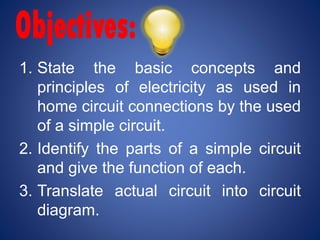Simple circuit with activity
- 1. Heavenly Father, we praise and glorify Your name. We are humbly asking for Your guidance throughout this day. May we have the wisdom to understand the lesson we will have today. Let Your light shine to those who are in the midst of darkness and those who are in lack of hope. May they be enlighten by Your grace and lead them back to You. We are thankful today that we are alive and well. That we are given another chance to partake with the fullness of life. Most especially have the opportunity to do good and be of service to mankind. AMEN.
- 3. ?
- 4. Oppah electric style! Load, load, load, lo-load Oppah electric style! Wire, wire, wire, wi-wire Oppah electric style! Source, source, source, so-source
- 6. 1. State the basic concepts and principles of electricity as used in home circuit connections by the used of a simple circuit. 2. Identify the parts of a simple circuit and give the function of each. 3. Translate actual circuit into circuit diagram.
- 8. 1. Prepare a simple electrical circuit out of available materials. 2. Draw a circuit diagram for the set-up. Label each part. 3. Draw a schematic diagram for a simple electrical circuit.
- 10. 1. Do not play with the materials while performing the activity. 2. Connect the wires properly and handle it with care. The end of the wire could hurt you.
- 11. ŌĆó Finish the activity ŌĆó Prepare for the group reporting
- 12. 1. How will you call the set up? 2. What are the basic components of a simple electrical circuit? 3. Which component corresponds to the load? 4. How does current flow in the circuit? 5. Which provides energy in the circuit? 6. Which one provides the passage of electricity? 7. What regulates or control the flow of currents? 8. What happens to the light bulb when the switch is on? 9. What does the glowing bulb indicate? 10. What happens to the light bulb when the switch is off? What does this indicate?
- 14. A simple circuit is any arrangement of materials that permits electron to flow through it. + -
- 15. The component of a simple electrical circuit are: power source, connecting wire, switch and a load. ŌĆó The battery/power source provides energy in the simple electrical circuit. ŌĆó The connecting wires provide the passage of electricity ŌĆó The switch serves to open or close the circuit. ŌĆó The load/bulb works when all of the component are present and when the circuit is closed.
- 16. In a closed circuit, there is a continuous flow of electrons. In an open circuit, there is an uninterrupted flow of electrons.
- 17. ’āśYes, because lighting fixtures and appliances are compose of the simple electrical component such as load, switch, wire and power source.
- 18. A. Draw the schematic diagram of a simple circuit and label the parts. (5 points) -Light bulb symbol Battery Wire Switch Bulb
- 19. B. Multiple Choice Direction: Choose the letter of the correct answer. 1. What will happen to the circuit if the switch is turned on? Electric current will be conducted through the wire. The circuit remains open. No change will take place in the circuit. The power supply will not diminish. A B C D
- 20. 2. Which of the following is an example of a controlling device? push buttons battery 3. Where does current follow a complete, closed path? wire A B C D A B C D wire appliance insulator fuse circuit
- 21. 4. What happens when the circuit is open? Current flows in the circuit. No current flows in the circuit. The bulb lights. None of above. A B C D 5. What will happen to a bulb if you remove the battery from the simple circuit? It will stay lighted go off get brighter get dimmer A B C D
- 22. A. Bring the following materials: 10 resistor 4 dry cells 4 alligator clip 4 connecting wires Graphing paper B. Find the relationship between the basic electrical quantities voltage, resistance and current. Reference: Physics IV SEMP Series pp. 146-148






















